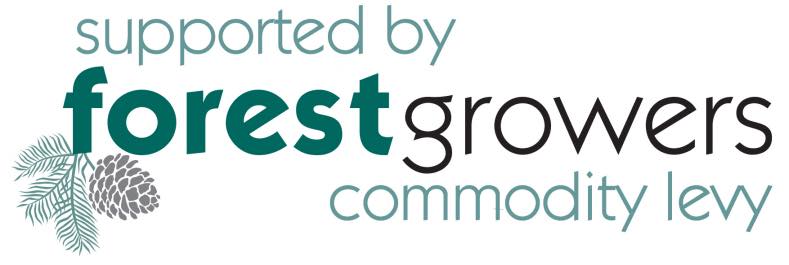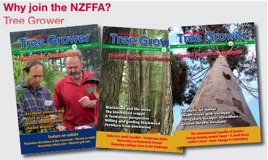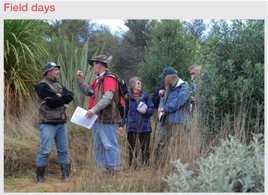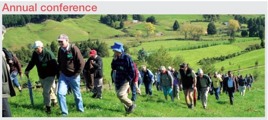
This is free.
Major Specialty Wood Products partners lead the way
Harriet Palmer and Peter Berg, New Zealand Tree Grower May 2019.
The Specialty Wood Products Research Partnership is a government and industry partnership which aims to develop high-value markets for timber from alternative, or specialty, species. The partners include several major large-scale forest owners. The NZFFA is also a partner, enabling owners of small forests to benefit from the structure of pooled investment and resources.
Major forest-owning partners include −
- Ernslaw One, New Zealand’s fourth-largest forest owner with over 111,000 hectares of forests and the largest Douglas-fir grower
- Juken New Zealand Ltd, a vertically integrated company with over 32,000 hectares of plantation forest in the eastern North Island and four processing plants in Northland, Gisborne and Masterton.
Ernslaw One and Douglas-fir research
Ernslaw One grows around 17,000 hectares of Douglas-fir as part of its forest estate of over 100,000 hectares. Its Douglas-fir plantations are found in the central North Island, Otago and Southland. The company continues to see a role for this species on cooler, high-altitude sites where snow is a regular occurrence, and is involved in a range of Douglas-fir research and development projects.
The quest for more straight trees
Ernslaw One has a well-established Douglas-fir breeding programme including trials dating back to 1959, with its own seed orchard in Ettrick, Central Otago, along with progeny testing programmes. Fifteen years ago it introduced new genetic material from Oregon and is working in collaboration with researchers from Scion and Oregon State University School of Forestry.

The current focus is on work to splice its Oregon material into original breeding populations, which are of Washington and Californian origin. Through the Specialty Wood Products it is working with Scion’s tree breeding team to develop and test this and other new progeny. Its input means new seedlots, with improved growth, form and wood quality characteristics will be available to all growers on the open market.
Douglas-fir growers would like to see another 40,000 hectares planted by 2050, which is why genetic improvement is important. While the broad-scale breeding aims for New Zealand’s Douglas-fir growers are around a combination of improved growth and quality, a specific area of interest for Ernslaw One is to improve average tree form, in other words, to grow more straight trees.
Production thinning
Ernslaw One is also busy exploring the potential for mid-rotation production thinning in Douglas-fir, to help overcome the financial disadvantages of Douglas-fir’s relatively long rotation length. The South Island forest planner Mark Dean reports success with mechanised production thinning.
Output from a two-man mechanised crew on operational scale sites ranges between 80 and 120 tonnes a day, and there is no problem in marketing small trees down to a small end diameter of just 10 cm. Demand comes from domestic sawmills and export markets. Returns are competitive with radiata pine, but good tree form is essential if the whole tree is to be marketed.

New products coming on stream
Related to this, Ernslaw One is supporting research into new products to improve the value of Douglas-fir thinnings, top logs and poor-form trees. The Specialty Wood Products programme has a target of increasing the value of low-value short length Douglas-fir logs by $70 a cubic metre. A newly developed laminated, finger-jointed wood product called oriented engineered lumber (OEL) is under development, made from timber lengths as short as one metre. Testing continues with the owners of the process.
In addition, the company is supporting work at the University of Canterbury, testing cross laminated timber made from Douglas-fir. A recent visitor to the School of Engineering was the Hon Shane Jones, who commented that this was exactly the sort of value adding to home-grown timber that he would like to see more of. The November 2018 Tree Grower has a longer article on Douglas-fir processing advances.
Seven year research programme
Established in 2015, the seven-year Specialty Wood Products programme has a vision of producing higher value products, providing diversification and mitigating the risks of New Zealand’s radiata pine virtual monoculture while supporting regional development. The partners contribute cash, assistance in kind, along with governance and expertise via membership of the Programme Steering Group and the Technical Steering Team. A large part of the funding comes from the Forest Growers Levy Trust, another close link with forest owners large and small.
Specialty Wood Products partners
Forest Growers Levy Trust, Te Tumu Paeroa, Proseed, Marlborough Lines, Timberlands, Lake Taupo and Rotaira Forest Trust, Juken NZ, City Forests, NZ Farm Forestry Association, Southwood Exports, Blakely Pacific, Ernslaw One, Vineyard Timbers.
All partners have an interest in one or more of the selected alternative species groups – namely Douglas-fir, the cypresses along with durable and non-durable eucalypts. Research programmes directed by the partnership focus on increasing the value of trees which are already in the ground, and on breeding better trees for the future.
Involvement enables partners to work with others with similar interests, and to benefit from pooled funds and resources including a significant contribution from the Ministry for Business, Innovation and Employment (MBIE), meaning in theory a much better result in terms of research and development investment.
Growing durable eucalypts
Juken New Zealand Ltd is a well-known Japanese-owned company with forests in the Wairarapa and East Coast districts and mills in Masterton, Gisborne and Kaitaia, Northland. Juken’s main alternative species interest is in durable eucalypts. There are several reasons for this according to Wairarapa Forest Manager, Sean McBride. First and foremost, the company recognises the risks associated with a radiata pine monoculture and wants to diversify. Second, it sees potential to incorporate durable eucalypt timbers into its product range.

Juken NZ mills produce a wide range of products destined for domestic and international markets. Over the past few years the company has built up a resource of over 350 hectares of durable eucalypts as part of its forest estate. Some durable eucalypts have been planted on cut-over sites and some are on new forest areas. As with all eucalypt growers, the preliminary challenge lies in selecting which species to plant and matching them to appropriate sites. Three Class 1 durable eucalypts have been selected so far to focus on −
- Eucalyptus bosistoana
- Eucalyptus cladocalyx
- Eucalyptus quadrangulata.
In addition, E. fastigata has been planted as a control species. This is a species which has already benefitted from some genetic improvement, unlike the three Class 1 species, where improved planting stock is not yet available. Juken NZ Ltd works closely with the NZ Dryland Forests Initiative as part of their involvement with Specialty Wood Products. The company hosts five trials on their properties, two of which are breeding trials, one each of E. globoidea and E. bosistoana. These trials have been planted to provide parent material for the long-term genetic improvement programme and are managed specifically for this purpose.

The other three trials are demonstrations and contain a much wider range of species. They are part of a large trial network testing the growth of up to 11 different ground durable eucalypt species on different site types and in different parts of north eastern New Zealand.
Testing silvicultural regimes
Beyond the Specialty Wood Products, Juken NZ Ltd has installed a number of permanent sample plots within their durable eucalypt plantings. Here they are evaluating different silvicultural treatments, aiming to develop regimes which will produce the types of crop trees which are most suited to their mills. Although it is early days, they are already learning a lot about just how much site factors influence the growth and form of their three selected species, and just how much variation exists in the unimproved genetic material.
The potential for durable eucalypt timber in two of its main product lines are as −
- A component of laminated veneer lumber, where it will improve stiffness properties
- A solid timber where its natural durability will probably appeal to the Japanese house construction market.
Early processing trials are under way, with test runs of E. bosistoana and E. quadrangulata as a component of laminated veneer lumber. Work has also been carried out on peeling and drying E. fastigata veneer and on bonding processes. Commercialisation of these mixed species processes is some way off at the moment.
Conclusion
Peter Berg is chairman of the Specialty Wood Products project steering group and is on the NZFFA Executive. Peter says that, as has always been the case with specialty species, the quest continues to develop critical mass. This is in terms of planted area and also in terms of productivity, which will then encourage investment in products and processing. The third element is to develop regional strategies whereby clusters of planting investment are matched by appropriate future wood processing developments – forest areas and species mixes suited to a future wood processing industry. By pooling funds and gaining government support, the partners in Specialty Wood Products are maintaining research ability and momentum while ensuring that at least some specialty forestry species’ programmes continue and even expand.
The importance of raising the quality of our forests and the wood that produced by them cannot be overstated. Such products improve grower’s returns and help access new markets with the possibility of raising the performance and value of existing radiata pine resource by using these products in combination could be very important for the existing industry. This has already been seen with paper where blending short fibre hardwood pulp, mostly eucalypt, with longer softwood fibres, such as radiata pine, has produced higher density and more valuable printing paper.
In this case, while large forest owners such as Ernslaw One and Juken NZ are leading the industry investment, farm foresters and others with an interest in growing higher quality species have the opportunity to benefit and to contribute to research direction. Their unique experience with a number of these species can help shape the programme. Their contribution through the NZFFA directly, and through the Forest Growers Levy Trust as a levy partner, ensures they sit at the technical and project governance tables.
You can read reports from the Specialty Wood Partnerships here.
Harriet Palmer is an independent forestry communications specialist. Peter Berg is chair of the Specialty Wood Products Project Steering Group.


 Farm Forestry New Zealand
Farm Forestry New Zealand

